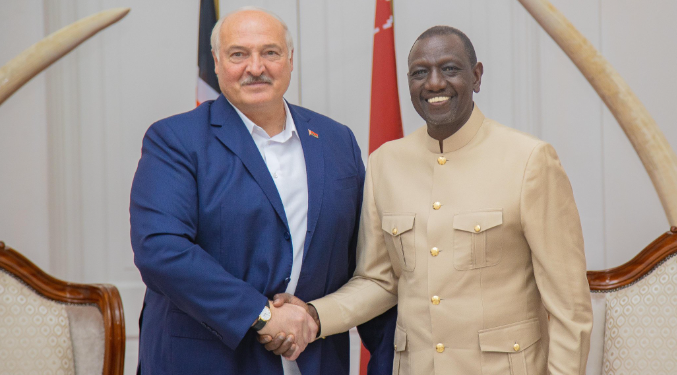President William Ruto met Belarus Head of State Aleksandr Lukashenko at State House, Nairobi, on Monday to discuss strengthening bilateral relations between the two nations.
Lukashenko proposed the development of a roadmap to steer Belarus-Kenya cooperation, emphasizing the need for a specific plan of action to enhance trade, economic ties, and political relations.
“Mr. President, if we come to an agreement, we will quickly go this way. Because your country holds a very important strategic position in Africa, you largely determine the policy of the African continent,” President Lukashenko stated.
The Belarusian leader suggested the exchange of visits by specialist groups from both countries to solidify plans for cooperation, extending an invitation for President Ruto to visit Belarus in the first half of the upcoming year.
President Ruto reciprocated the warm sentiments, welcoming Lukashenko to Kenya and expressing gratitude for the visit, despite its brevity.
He underscored the informal nature of the meeting as an opportunity to plan a more official visit in the future.
“We agreed that we would jointly look at our opportunities and areas where we could cooperate and build relations on the basis that we have created between our two countries,” William Ruto said.
Both leaders concurred on the necessity of exploring collaborative opportunities, intending to build on the groundwork laid between their nations.
The meeting follows a recent visit by a Kenyan delegation to Belarus earlier in the year, where discussions between the two countries revolved around agricultural mechanization, the supply of tractors, agricultural processing equipment, and access to Belarus’s renowned potash fertilizer production.
The latest meeting serves as a pivotal moment for Belarus and Kenya, marking a mutual resolve to expand their relationship across various domains.
President William Ruto met Belarus Head of State Aleksandr Lukashenko at State House, Nairobi, on Monday to discuss strengthening bilateral relations between the two nations.
Lukashenko proposed the development of a roadmap to steer Belarus-Kenya cooperation, emphasizing the need for a specific plan of action to enhance trade, economic ties, and political relations.
“Mr. President, if we come to an agreement, we will quickly go this way. Because your country holds a very important strategic position in Africa, you largely determine the policy of the African continent,” President Lukashenko stated.
The Belarusian leader suggested the exchange of visits by specialist groups from both countries to solidify plans for cooperation, extending an invitation for President Ruto to visit Belarus in the first half of the upcoming year.
President Ruto reciprocated the warm sentiments, welcoming Lukashenko to Kenya and expressing gratitude for the visit, despite its brevity.
He underscored the informal nature of the meeting as an opportunity to plan a more official visit in the future.
“We agreed that we would jointly look at our opportunities and areas where we could cooperate and build relations on the basis that we have created between our two countries,” William Ruto said.
Both leaders concurred on the necessity of exploring collaborative opportunities, intending to build on the groundwork laid between their nations.
The meeting follows a recent visit by a Kenyan delegation to Belarus earlier in the year, where discussions between the two countries revolved around agricultural mechanization, the supply of tractors, agricultural processing equipment, and access to Belarus’s renowned potash fertilizer production.
The latest meeting serves as a pivotal moment for Belarus and Kenya, marking a mutual resolve to expand their relationship across various domains.
Lukashenko’s proposal for a comprehensive roadmap signifies a concrete step toward defining the specifics of collaboration, focusing on the trade, economic, and political realms.
The anticipated visits by specialist groups from both countries are poised to facilitate a deeper understanding of each other’s strengths and areas of cooperation, setting the stage for more substantive engagement.
The anticipated visits by specialist groups from both countries are poised to facilitate a deeper understanding of each other’s strengths and areas of cooperation, setting the stage for more substantive engagement.
















